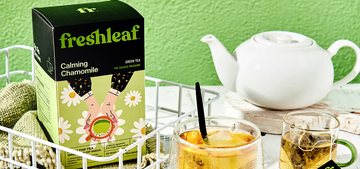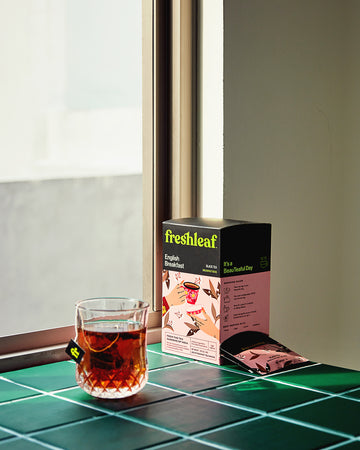Tea is healthy : India's Favourite Daily Beverage Gets US FDA's Approval
by Lovlesh Saini on Dec 23, 2024
To align the food consumed by today’s health-conscious individuals with established dietary guidelines, the Food and Drug Administration (FDA) continuously revises and enhances its regulatory framework. In a recent update, the FDA introduced a new rule that revises the criteria for the “healthy” nutrient content claim in food labeling. This update reflects the agency's ongoing commitment to ensuring that consumers are better informed about the nutritional value of their choices.
Notably, the FDA’s recognition of tea derived from Camellia sinensis as a healthy beverage has garnered widespread approval from prominent organizations, including the North Eastern Tea Association (NETA) and the Indian Tea Association (ITA). This acknowledgment is a significant milestone for the global tea industry, validating its long-held assertions about the health benefits of tea. Known for its antioxidant-rich composition and potential to support cardiovascular health, digestion, and mental clarity, tea has long been celebrated as a cornerstone of wellness-oriented lifestyles. The FDA’s decision underscores these benefits and bolsters tea's reputation as a vital part of a balanced diet.
On December 19, the Food and Drug Administration (FDA) unveiled a final rule aimed at updating the “healthy” nutrient content claim, a move designed to assist consumers in making more informed choices about foods that align with recommended dietary guidelines. As part of this significant update, tea derived from Camellia sinensis, commonly enjoyed in forms such as green, black, oolong, and white tea, is now officially eligible for the “healthy” label. This development represents a major stride in promoting transparency and empowering individuals to prioritize wellness through their dietary habits.
The announcement has been met with enthusiastic responses from industry leaders. Peter F. Goggi, President of the Tea Association of the USA, hailed the FDA's decision as “fantastic news” for the global tea industry. He emphasized its potential to grow tea's status as a health-enhancing beverage in the eyes of consumers. Echoing this sentiment, Bidyananda Borkakoty, an advisor to the North Eastern Tea Association (NETA) and former Vice-Chairman of the Tea Board of India, expressed his excitement about the landmark recognition. “We are thrilled with the FDA’s acknowledgment. Decades of global research have consistently highlighted tea’s health benefits. We strongly encourage the Indian government to take this opportunity to actively promote tea as a beverage that supports both wellness and a healthy lifestyle,” he remarked. This development further solidifies tea's place as a versatile and beneficial choice for consumers seeking to incorporate health-oriented drinks into their daily routines.
In a statement released by the North Eastern Tea Association (NETA), the Food and Drug Administration (FDA) recognized prior research highlighting the potential health benefits associated with tea derived from Camellia sinensis. Among these benefits are studies suggesting a possible link between tea consumption and reduced risks of certain cancers, as well as improved heart and metabolic health. This acknowledgment underscores the beverage’s longstanding reputation as a health-promoting choice.
However, the FDA clarified that the “healthy” designation does not extend to herbal teas or infusions made from plants other than Camellia sinensis. Popular herbal beverages such as peppermint, ginger, lavender, hibiscus, butterfly pea flower, and masala tea remain excluded from this classification.
In an official statement, the FDA addressed the distinction: “Currently, we lack sufficient scientific evidence to universally qualify herbal infusions for the ‘healthy’ claim. This designation is limited to tea derived exclusively from Camellia sinensis.” This clarification aims to provide transparency while ensuring that the “healthy” label is backed by rigorous scientific support. While herbal teas offer various benefits of their own, this ruling reinforces the unique health attributes of traditional tea, solidifying its position as a standout beverage in the wellness category.
The Indian Tea Association (ITA), a prestigious and longstanding organization representing the country’s tea producers, celebrated the FDA’s recent decision as a groundbreaking milestone for the tea industry. This recognition not only affirms the health benefits of tea but also opens up new opportunities for the global tea market to position its products as part of a wellness-oriented lifestyle.
In a statement, the ITA expressed its enthusiasm, noting, “The Indian Tea Association is delighted that the FDA has formally recognized tea as a ‘healthy’ beverage under its revised criteria. This ruling allows tea manufacturers to voluntarily label their products with the ‘healthy’ claim, provided they adhere to the outlined standards.”
The association further emphasized key insights from the FDA’s executive summary, which clarified the eligibility criteria for the designation. According to the summary, beverages such as water, tea, and coffee that contain fewer than five calories per reference amount customarily consumed (RACC) and per labeled serving automatically qualify for the “healthy” label. This inclusion underscores tea’s natural alignment with health-conscious dietary choices, given its minimal caloric content and well-documented benefits. The ITA hailed this as a significant step toward raising awareness of tea’s role in promoting a healthier lifestyle, both in India and globally.
“This decision affirms the nutritional merits of tea and empowers consumers to make more informed dietary choices,” the Indian Tea Association (ITA) stated, highlighting the broader implications of the FDA’s ruling. The association underscored the fact that tea, derived from Camellia sinensis, is not just a culturally significant beverage but also a scientifically endorsed one.
Tea’s abundant antioxidants, such as catechins and polyphenols, play a crucial role in combating oxidative stress, which is linked to various chronic diseases. Its association with health benefits like improved heart health, enhanced digestion, and better metabolic function underscores the importance of the FDA’s recognition.
The ITA emphasized that this acknowledgment is particularly meaningful in today’s health-conscious landscape, where consumers are increasingly seeking beverages that align with wellness goals. “By officially recognizing tea as a ‘healthy’ beverage, the FDA has not only validated its nutritional value but also spotlighted its role as a cornerstone of a balanced, health-oriented lifestyle,” the ITA added. This ruling reinforces tea’s standing as both a traditional favorite and a modern-day health companion.
This decision affirms the nutritional merits of tea and empowers consumers to make more informed dietary choices,” the Indian Tea Association (ITA) stated, emphasizing the FDA’s recognition of tea’s health benefits. Freshleaf Teas, crafted from the finest Camellia sinensis leaves, perfectly align with this acknowledgment. Rich in antioxidants like catechins and polyphenols, Freshleaf’s range of teas, including Himalayan Green, Kashmiri Kahwa, and Tulsi Green, offers not only delightful flavors but also numerous health benefits such as improved digestion, better heart health, and enhanced focus.
With the FDA’s recognition, Freshleaf Teas stands as a proud example of a beverage that blends tradition with modern wellness, providing consumers with a premium choice that supports their journey toward healthier living. Whether you’re enjoying a calming cup of Chamomile or a revitalizing sip of Moroccan Mint, Freshleaf embodies the essence of tea’s nutritional value, now officially celebrated on a global platform.


